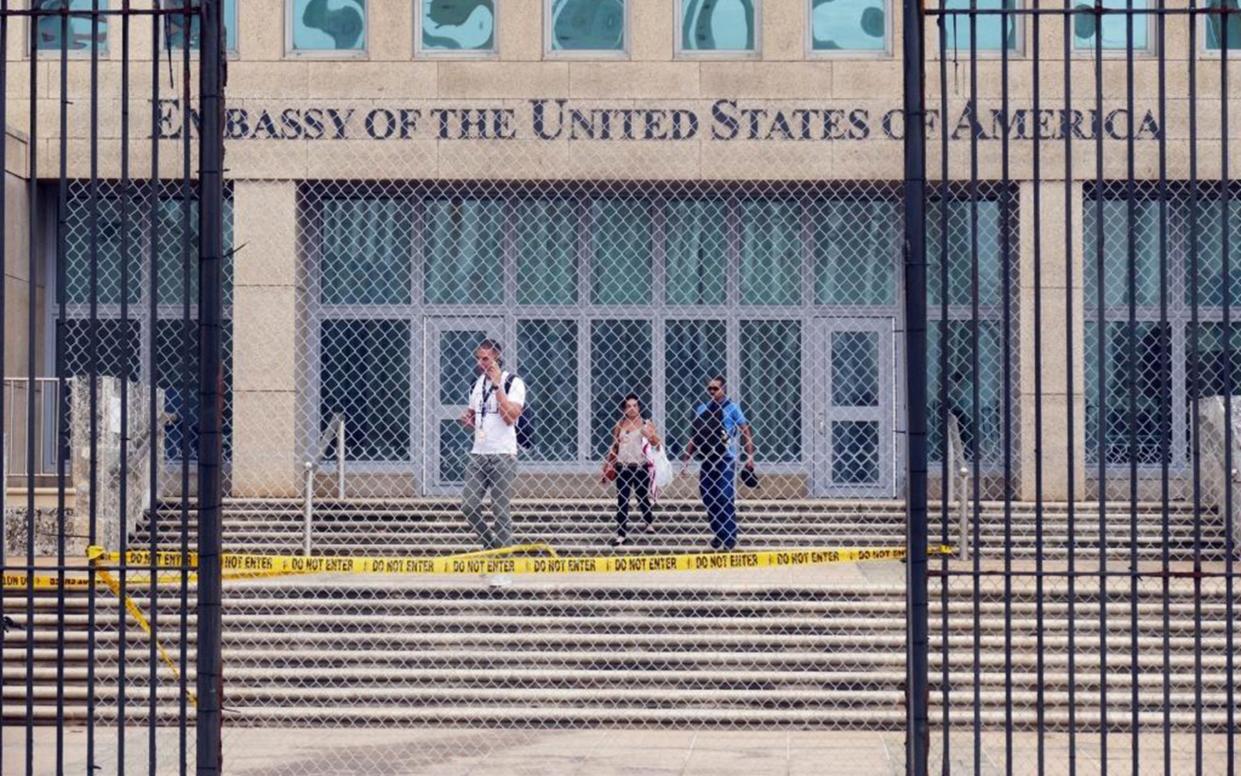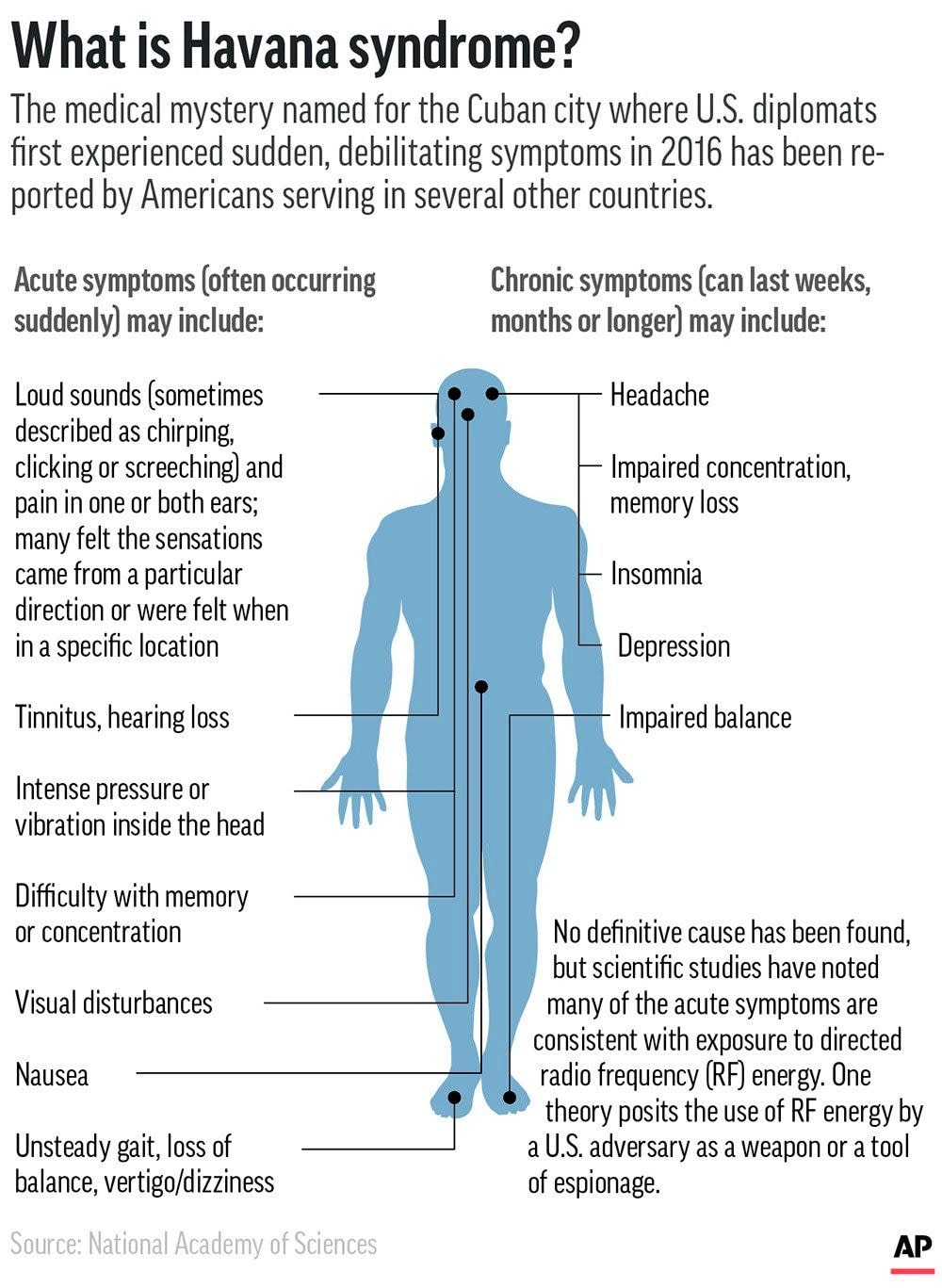Havana Syndrome investigation links Russia to mysterious brain injuries

A secretive Russian intelligence unit may have been responsible for Havana Syndrome, the debilitating sickness which has struck US diplomats, spies, contractors and their families, an investigation has found.
Research by The Insider, an independent Russian investigative website, the German news magazine Der Spiegel and the CBS documentary series 60 Minutes has pinned the blame on the GRU’s Unit 29155.
Members of the unit are alleged to have used sonic weapons, using radio frequencies to target their victims’ brains.
Victims, their lawyer and a retired American army lieutenant colonel have also claimed that the American intelligence community has covered up the Russian involvement.
Just over a fortnight ago, the US National Institutes of Health (NIH), which conducted an extensive study into Havana Syndrome, could find no clinical explanation.
Victims have suffered an array of mysterious health issues including hearing loss, insomnia, memory loss, poor balance and inability to concentrate.
The symptoms, which lasted for months, followed victims complaining of pain in their ears and feelings of strong pressure inside their heads.
It was dubbed “Havana Syndrome” after staff at the US embassy in Cuba started complaining of the sickness in 2016.
However, according to the investigation, the first cases date back to 2014 when four Americans stationed in Frankfurt reported symptoms. Similar complaints were made later that year by CIA officers in Ukraine.
A medical explanation was given by Dr David Relman of Stanford University.
“What we found was we thought clear evidence of an injury to the auditory and vestibular system of the brain,’’ Dr Relman said.
“Everything starting with the inner ear where humans perceive sound and sense balance, and then translate those perceptions into brain electrical signals.”
More than 100 Americans – in the US and stationed abroad – have suffered what have been officially classified as anomalous health incidents.
Olivia Troye, who was homeland security adviser to former Vice President Mike Pence, was one of the victims when she was attacked in Washington DC.
“It was like this piercing feeling on the side of my head. It was like, I remember it was on the right side of my head and I, I got like vertigo,” she told 60 Minutes.
Another victim, who was working in Tbilisi described how she heard a piercing sound.

Christo Grozev, an investigative journalist who has done extensive research into Russian intelligence, identified the alleged assailant as Albert Averyanov.
According to intelligence sources Mr Averyanov, whose name appears on travel manifests, is the son of the founder of Unit 29155,
Shown a photograph of Mr Averyanov, the Tbilisi victim said he was the man she saw in a car outside her home.
Trawling through intercepted Russian intelligence documents, travel logs and eye-witness testimony, the investigation concluded it was the work of Unit 29155.
It was this unit, originally a training arm within the Russian intelligence service GRU, which was responsible for the attempted assassination of Sergei Skripal in Salisbury in 2018.
Russian spies were meticulous in covering their tracks. For example, they were careful to take a circuitous route to where they were due to carry out their operation.
Another victim, Mark Lenzl, a serving State Department official who was medevaced from Guangzhou, with his wife and two children in early June 2018 has little doubt the Russians were responsible for the attack.
“I absolutely believe my background on Russia is why I was targeted,” Mr Lenzi told The Insider.
‘‘The US government shrugs publicly about my family’s ordeal.
“But US government personnel behind closed doors have acknowledged to me that my and my family’s diagnosed traumatic brain injuries are due to exposure to high levels of pulsed microwave radiation.”
Mark Zaid, a lawyer representing many of the victims, accused the US government of concealing the truth.
“It has been so distressing to see how much effort our government has undertaken to cover up the true details of these attacks, no doubt perpetrated by a foreign adversary,” Mr Zaid said.
Greg Edgreen, who ran a Pentagon investigation into the attacks, had little doubt the Russians were responsible.
“One of the things I started to notice was the calibre of our officer that was being impacted,” said Mr Edgreen, who is now retired.
“This wasn’t happening to our worst or our middle-range officers. This was happening to our top five per cent, 10 per cent performing officers across the Defense Intelligence Agency.
“And consistently there was a Russia nexus. There was some angle where they had worked against Russia, focused on Russia, and done extremely well.”
However, the Office of the Director of National Intelligence disputed his conclusion.
In a statement, it said the incidents “were the result of factors that did not involve a foreign adversary.”


